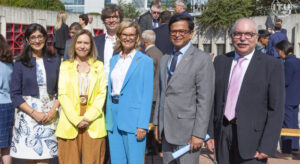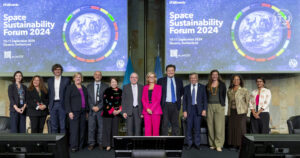EUTELSAT IGO participated in the 1st Space Sustainability Forum on 10-11 September 2024 in Geneva at the invitation of the ITU Secretary General, Mrs Doreen Bogdan-Martin. Co-organised with the Radiocommunication Department of the ITU, the Forum convened top leaders, experts and regulators from the entire satellite and space industries to discuss policies and strategies to ensure the sustainability of outer space activities today and for future generations. With 2000 participants online and on-site, representing more than 90 countries, the ITU initiated a powerful dynamic with this Forum and prepared the ground for further work in recognising space as a unifier for humanity and as catalyst for the UN SDG targets.

While it is not all doom and gloom, the matter of space sustainability needs to be addressed now. All involved international organisations, near or far, must get to grips with these issues and build the necessary bridges to make it a priority for all actors involved in space. With UNOOSA, space sustainability is defined as “the ability to maintain the conduct of space activities indefinitely into the future in a manner that realises the objectives of equitable access to the benefits of the exploration and use of outer space for peaceful purposes, in order to meet the needs of the present generations while preserving the outer space environment for future generations”.

Within the ITU, space sustainability is a tangible reality which is enshrined in its Constitution stating that radio frequencies and associated orbits are a limited natural resource to be used rationally, efficiently and economically. 80% of the issues handled by the World radiocommunication conference are space related. According to the director of the BR, any satellite deployments, which numbers have grown tremendously for non-GSO systems in the last 5 years, are required to follow coordination and notification processes to operate free from harmful interference.
Considering the increasing number of satellites in the Low Earth Orbit, the last Plenipotentiary Conference in 2022 and the Radiocommunications Assembly in 2023 both adopted resolutions tasking the ITU-R to carry out actions in relation to the sustainability of the radio-frequency spectrum and associated satellite-orbit resources and contribute to the implementation of the UN “Space 20230” agenda.

To avoid debris in the most congested areas in LEO, satellite operators (SpaceX Starlink, Amazon Project Kuiper, Eutelsat Group with OneWeb, SES O3b, Telesat and Shanghai SSST) all recognised that in order to reach their targeted positions, they need to first perform a significant number of collision avoidance manoeuvres (most with autonomous systems) and adequately respond to conjunction warning messages on a daily basis. Data sharing amongst operators, as well as the development of compatible collision avoidance systems, are and will remain crucial to reduce collision risks and ensure space safety in the medium term.
Space agencies, regional and international entities all recognised that with millions of debris gravitating around Earth, and now even around the moon, those amplified by the Kessler effect, it is more important than ever to find a balance or holistic approaches combining rules, best practices or standards that would all contribute to enhancing collaboration across all stakeholders of the space society.

EUTELSAT IGO has always been committed to raising awareness on the issue of sustainability of outer space activities and on space as a driver for sustainable development. Space economy, use and exploration need to be safeguarded for the benefit of the Earth and humanity. A holistic approach is much needed to maintain space sustainability for now and future generations and this is when international organisations can play a critical role. WRC-27 is just around the corner and it will be then that space sustainability will become a reality.
Photo credit: ©ITU/D.Woldu
